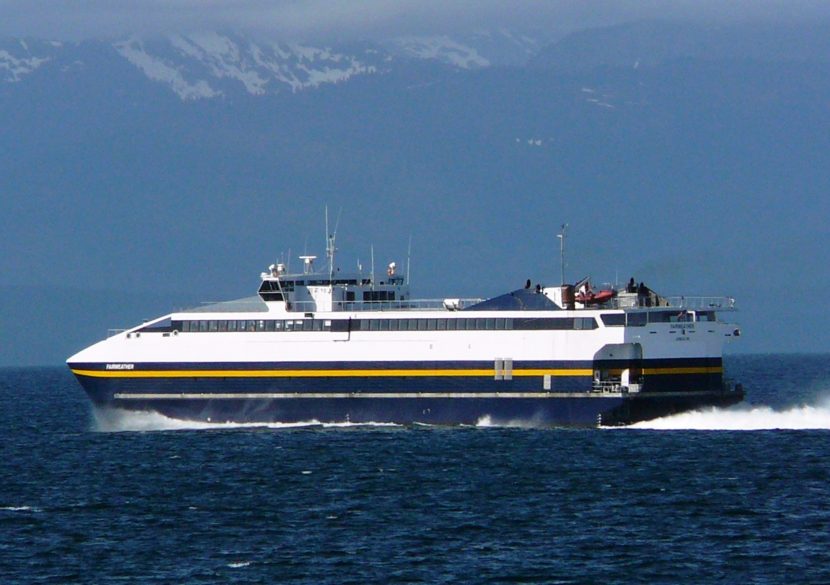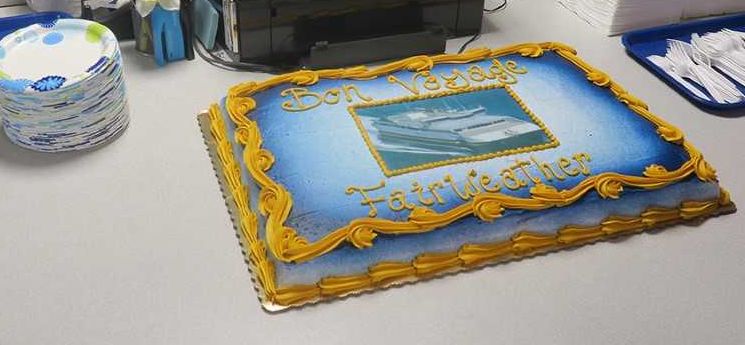
Alaska’s fast-ferry completed what’s likely to be its last Southeast run this past weekend. That’s sparked sadness over the loss of a popular service and concern over the future reliability of the Alaska Marine Highway.
When the M/V Fairweather entered service in 2004, there was excitement over the catamaran capable of doing 32 knots. That allows it to run from Juneau to other Southeast ports in about half the time it takes the rest of the fleet.
During the ferry’s run from Skagway and Haines to Juneau on Sept. 9, the Fairweather’s crew made an announcement. One of the passengers on board, 34-year-old Carl Brodersen of Juneau, set the scene.
“There’s two stone-faced looking officers standing on either side of a cake that says ‘Bon Voyage Fairweather,’” Brodersen said Tuesday, “and they explain that this almost assuredly the last voyage the Fairweather is going to take in Southeast.”
Frosted cake was shared between passengers and crew.
It was, Brodersen said, “a moment of real sadness at realizing that something that’s been an important part of Southeast for years and years and years is probably going away.”
There were originally two fast ferries. But the Fairweather’s sister ship, the M/V Chenega has been tied up since 2015 when the state said it couldn’t afford to run it.
Officially, at least, the fate of the sole remaining fast ferry remains undecided. Two brand new Alaska-class vessels are expected to enter service next year, putting the future of Fairweather in doubt.
“Basically, we can’t keep the same ships running when you got two new ones coming in,” Alaska Marine Highway System General Manager John Falvey said. “So we’re in the process of making those decisions and we’ve not made those decisions yet.”

The slower Alaska-class vessels have more passenger and vehicle capacity. They’re also touted to be more fuel-efficient and hence less expensive to run than the fast ferries – and more seaworthy in harsh winter weather.
When the first Alaska-class is delivered, that’s when Falvey said it’s decision time.
“We will need to take a very close look at what is the best fleet mix as far as service, as far as budgets and funding, to go forward from May 1,” Falvey said.
The Legislature has cut ferry funding by about $29 million over the past five years. That’s led to inevitable cuts to service.
“I think there’s a general concern really what the long-term viability is for service, especially for some of our smaller communities, as we see more and more of the fleet aging and being retired,” Robert Venables, chair of Alaska’s Marine Transportation Advisory Board, said. “We’re seeing a swap out of vessels with the Alaska-class ferry, but at the same time we’re not quite sure exactly how it’s going to be scheduled or deployed so that does leave a lot of potential riders wondering how it’s going to work out.”
Southeast residents like Carl Brodersen in Juneau say service cuts are making it harder to use the ferry on a regular basis.
“You used to be sure that there was always going to be a good, convenient ferry for when you wanted to make a trip and we simply don’t have that anymore,” Brodersen said.
That leads to what Broderson describes as a “death spiral.”
“The schedules are not good because they don’t have enough passengers because people can’t take the ferry because the schedule isn’t good,” Broderson said.
For now, the Fairweather remains on the job – but in Prince William Sound, not in Southeast.
As it did last winter, the ship will connect the communities of Cordova, Whittier and Valdez. At least until May, when its future in the fleet will be decided.
Jacob Resneck is CoastAlaska's regional news director in Juneau.




